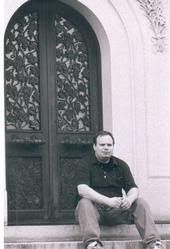Like many of you who read this blog, I was seething when I first heard the announcement that DAWN OF THE DEAD was being remade. How dare they tamper with Romero's classic, cried the dissidents (I know, I was among them). Heads were demanded on platters. Solemn death vows were sworn. They're gonna fuck it up, we railed. Jesus, they got the guy who wrote the fuckin' SCOOBY-DOO movie to do the screenplay for God's sake!
And when the film finally premiered we shuffled into our local multiplexes like the condemned headed to the gallows, visions of the PSYCHO and THE TEXAS CHAINSAW MASSACRE remakes hanging overhead. Yet when the house lights went up at the end of the film you could hear a collective sigh of relief and bemused surprise.
Holy shit, that wasn't bad at all. Pretty damn good, even.
I exaggerate, of course, but if there was ever a movie that benefited greatly from zero expectations it was Zack Snyder's 2004 remake of DAWN OF THE DEAD. It benefited so much that all it took was a second viewing to demote it from "horror classic of the new millennium" to "not-bad studio fright film." While I still think it's a decent picture, with a little critical perspective it's quite easy to see the flaws in this well-made but shallow Hollywood product.
After an incredible prologue to get the story rolling (I've come to find that the earliest stages of an undead epidemic, as characters realize the severity of their situation and are forced to adapt, is my favorite part of apocalyptic-styled zombie films), it becomes clear that the new-and-improved DAWN is trading the original's pitch-black satire for slick Hollywood escapism. It succeeds in large part because it respects Romero's source material, even if his based-on credit lasts for all of a half-second. And though Snyder keeps a tight rein on the flashy excesses that mar most commercial directors' feature debuts, credit largely belongs to James Gunn's script (which is fair, since a lot of us blamed Gunn for ruining everything before the film came out).
Fans of the original got thrown bones in the form of cameos from Tom Savini, Scott Reininger, and Ken Foree; while it's a treat to see each of them, only the latter emerges as more than a gimmicky snippet. Foree gets to repeat his famous "When there's no more room in Hell" line, this time as a Falwell-esque condemnation of non-Christian lifestyles, a modern context that resonates more than the rest of the movie's "subtext" (i.e. a Muzak version of "Don't Worry, Be Happy" over the mall's PA, or naming its Starbucks-like coffee kiosk Hallowed Grounds). Fan-satiating cameos aside, Snyder has assembled a solid cast, but kudos go to Sarah Polley, who gives the proceedings credibility with her strong portrayal of the female lead, and Ving Rhames, whose grit also helps ground the film in reality.
But DAWN's also got its share of problems, and I'm not referring to its upgraded fast zombies (me, I didn't have a problem with them, I thought they were a natural cinematic progression). Despite getting to the mall much quicker than the original, the new version completely misses the point of a self-made mini-utopia. Even if Snyder wasn't interested in satirizing consumerism, he neglects the potential of the material wish-fulfillment implicit in its premise, grist which would've been perfect for a big-budget studio film. DAWN also rehashes many zombie tropes--the infection is spread through bites, shoot 'em in the head to kill them--as if they're new, though to the film's target audience, they probably are. (Pardon me as I cringe a little.)
I'd pin DAWN's biggest flaw on the size of its cast. Snyder populates his mall with more players, supplying a bigger cross-section of society, but most of these peripheral characters feel like dead weight, sending the plot into several unneeded digressions (such as a maudlin scene involving a bitten Matt Frewer). Even though it runs roughly ten minutes shorter than the original, the new DAWN feels much longer.
If the 2004 version has any edge over its predecessor, I'd say it's with its ending. Not that I'm faulting Romero, who I felt brought a suitable closure to his story, but I did like how Snyder suggested the feel-good, studio-approved denouement many of us feared, then slipped us a downbeat coda over its end credits. This sequence, with its rapid editing and barrage of gruesome images, left me feeling somewhat sucker-punched.
(Special thanks to Dustin Stewart for his assistance with this blog.)
Saturday, March 1, 2008
Subscribe to:
Post Comments (Atom)

No comments:
Post a Comment